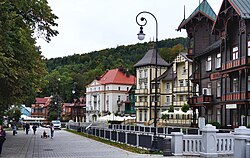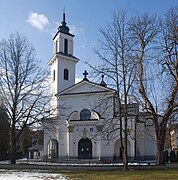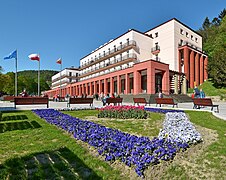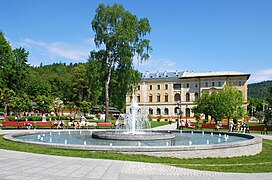| Krynica-Zdrój | |
|---|---|
 Health resort (kurort) Health resort (kurort) | |
 Flag Flag Coat of arms Coat of arms Logo Logo | |
 | |
| Coordinates: 49°24′42″N 20°57′18″E / 49.41167°N 20.95500°E / 49.41167; 20.95500 | |
| Country | |
| Voivodeship | |
| County | Nowy Sącz |
| Gmina | Krynica-Zdrój |
| Government | |
| • Mayor | Piotr Ryba (PiS) |
| Area | |
| • Total | 40.17 km (15.51 sq mi) |
| Elevation | 590 m (1,940 ft) |
| Population | |
| • Total | 11,243 |
| • Density | 280/km (720/sq mi) |
| Postal code | 33-380 |
| Website | http://www.krynica-zdroj.pl |
Krynica-Zdrój (until 31 December 2001 Krynica, Rusyn: Криниця Yiddish: קרעניץ) is a town in Nowy Sącz County, Lesser Poland Voivodeship, southern Poland. It is inhabited by over eleven thousand people. It is the biggest spa town in Poland often called the Pearl of Polish Spas; and a popular tourist and winter sports destination situated in the heart of the Beskids mountain range.
History and economy
Krynica was first recorded in official documents in 1547 and was granted town rights in 1889. In the 17th century, mineral waters were discovered in the area. In 1856, the town began rapidly developing into a health resort largely thanks to the activities of Józef Dietl, a Jagiellonian University professor considered the "father of Polish balneology".
By the end of the 19th century, the town had acquired a considerable reputation for its picturesque location and its health resort facilities. It was frequented by Polish elites and intellectuals. Among notable visitors were Jan Matejko, Artur Grottger, Henryk Sienkiewicz and Józef Ignacy Kraszewski. In the interbellum period the town attracted such individuals as Ludwik Solski, Helena Modjeska, Władysław Reymont, Julian Tuwim, K.I. Gałczyński and Jan Kiepura.
Krynica's development was also boosted by the construction of a railway line to Muszyna in 1876, which was further expanded to Krynica-Zdrój in 1911. After World War I, many of the town's buildings were renovated and new spa facilities were built including Nowe Łazienki Mineralne, the Lwigród Guesthouse, and the New Spa House. A popular funicular railway was also constructed to Mount Parkowa.
Due to its convenient location, infrastructure and rail connections with major cities in Europe, Krynica-Zdrój (Zdrój means mineral spring in Polish) was the location of winter sports tournaments during the interwar period, including the 1931 World Ice Hockey Championships and the 1935 FIL European Luge Championships. In the post-war period, the town has hosted the 1958 and 1962 FIL World Luge Championships, the 2004 Euro Ice Hockey Challenge, and the 2018 and 2020 Winter World Polonia Games.
A gondola lift built in 1997 on Mount Jaworzyna Krynicka overlooking Krynica, and subsequent investment in modern skiing facilities (apart from the former track of bobsleigh) made Krynica one of the most important ski resorts in Poland. Nearby Beskid Sądecki mountains are also a perfect setting for recreational cross-country skiing in winter and hiking as well as mountain-biking in summer.
The winter sport of bandy returned to Poland in the 2010s, after many decades. When the country made their first international appearance in 2006 at the World Championships for boys U15 in Edsbyn, Krynica-Zdrój contributed with most players.
Krynica was home to Nikifor (birth name Epifaniusz Drowniak), a famous naïve painter in communist Poland.
Geography
Krynica-Zdrój is located in Southern Lesser Poland in Beskid Sądecki, within the Poprad Landscape Park protected area. The city center lies in the valley of Kryniczanka river and is connected with the nearby Mount Parkowa and Mount Jaworzyna Krynicka by cable railways.
Points of interest
- Pump-room Slotwinka in Park Slotwinski - built in 1815 (open only in summer)
- Koncertowa pavilion in Park Slotwinski - built in 1870 (today with a restaurant inside)
- Old Baths (Stare Łazienki) - built in 1866 by Feliks Księżarski
- Old Spa House (Stary Dom Zdrojowy) built 1880-1889 by Jan Zawiejski in Renaissance Revival style
- New Spa House (Nowy Dom Zdrojowy) built 1938-1939 by Witold Minkiewicz in Modernist style
- Main Pump Room (Pijalnia Główna) built 1969-1971 by Zbigniew Mikołajewski and Stanisław Spyt in International Style
- 19th-century Lemko Greek Catholic Tserkva of Guardianship of the Blessed Virgin Mary (1875–1879)
- Church of the Assumption - built 1887-1892 by Jan Zawiejski in Renaissance Revival style
- Historical 19th-century villas including The Góral Villa, The Biała Róża Villa , The Janina Villa and The Biały Orzeł Villa
- Modernist Patria Hotel designed by Bohdan Pniewski and built in 1932
- Viewing tower built on top of the Słotwina Arena ski resort in 2019
Gallery
-
 Old Baths (Stare Łazienki)
Old Baths (Stare Łazienki)
-
 Old Spa House (Stary Dom Zdrojowy)
Old Spa House (Stary Dom Zdrojowy)
-
 Main Pump Room (Pijalnia Główna)
Main Pump Room (Pijalnia Główna)
-
 Tserkva of Guardianship of the Blessed Virgin Mary
Tserkva of Guardianship of the Blessed Virgin Mary
-
 Church of the Assumption
Church of the Assumption
-
 Patria Hotel
Patria Hotel
-
 New Spa House (Nowy Dom Zdrojowy)
New Spa House (Nowy Dom Zdrojowy)
-
 Musical Fountain
Musical Fountain
-
 Witoldówka Villa
Witoldówka Villa
-
 Viewing tower
Viewing tower
International relations

Krynica was sometimes nicknamed "Eastern Davos" for the Economic Forum held there each year in September since 1992 until the forum was transferred to the Lower Silesian town of Karpacz in 2019. Politicians (including heads of state) and businessmen from several countries of Central Europe, Russia, Central Asia and the Middle East met there to discuss economic and political matters. Also, part of the inhabitants of Krynica belong to the Lemko minority who speak an Eastern Slavic language called Rusyn.
Twin towns — Sister cities
See also: List of twin towns and sister cities in PolandKrynica-Zdrój is twinned with:
 Amersham, England, United Kingdom
Amersham, England, United Kingdom Bad Sooden-Allendorf, Hesse, Germany
Bad Sooden-Allendorf, Hesse, Germany Bardejov, Slovakia
Bardejov, Slovakia Khmilnyk, Ukraine
Khmilnyk, Ukraine
Notable people
See also: Category:People from Krynica-Zdrój- Henryk Szost (born 1982), long-distance runner
- Jakub Czerwiński (born 1991), footballer
- Katarzyna Kawa (born 1992), tennis player
- Jan Kiepura (1902–1966), singer and actor
- Joanna Kulig (born 1982), actress
- Nikifor Krynicki (1895–1968), naïve painter
- Agnieszka Skalniak-Sójka (born 1997), racing cyclist
- Andrzej Zabawa (born 1955), ice hockey player
See also
External links
References
Notes
- ^ "Historia Miasta". krynica-zdroj.pl (in Polish). Retrieved 11 May 2024.
- ^ "Krynica - historia naszego miasta". krynica24.pl (in Polish). 20 April 2020. Retrieved 11 May 2024.
- "Ojciec polskiej balneologii". dziennikpolski24.pl (in Polish). 17 June 2004. Retrieved 11 May 2024.
- Nowak, Leonard. "Timeline of World Polonia Winter Games (1986–2016)" (PDF). Prace Naukowe. 2017 (3): 85–105.
- ""Stowarzyszenie Wspólnota Polska"". www.wspolnota-polska.org.pl. Retrieved 2022-02-03.
- "Sorrels, bulgotkas and pearls carved from wood". visitmalopolska.pl. Retrieved 11 May 2024.
- Bandy World Championships 2006: Poland roster. Homepage.
- "Nikifor". culture.pl. Retrieved 11 May 2024.
- "World Bank in the Krynica Economic Forum – the "Davos for Eastern Europe"". Retrieved 2024-05-11.
- "Miasta partnerskie". krynica-zdroj.pl (in Polish). Retrieved 11 May 2024.
| Gmina Krynica-Zdrój | ||
|---|---|---|
| Town and seat |  | |
| Villages | ||